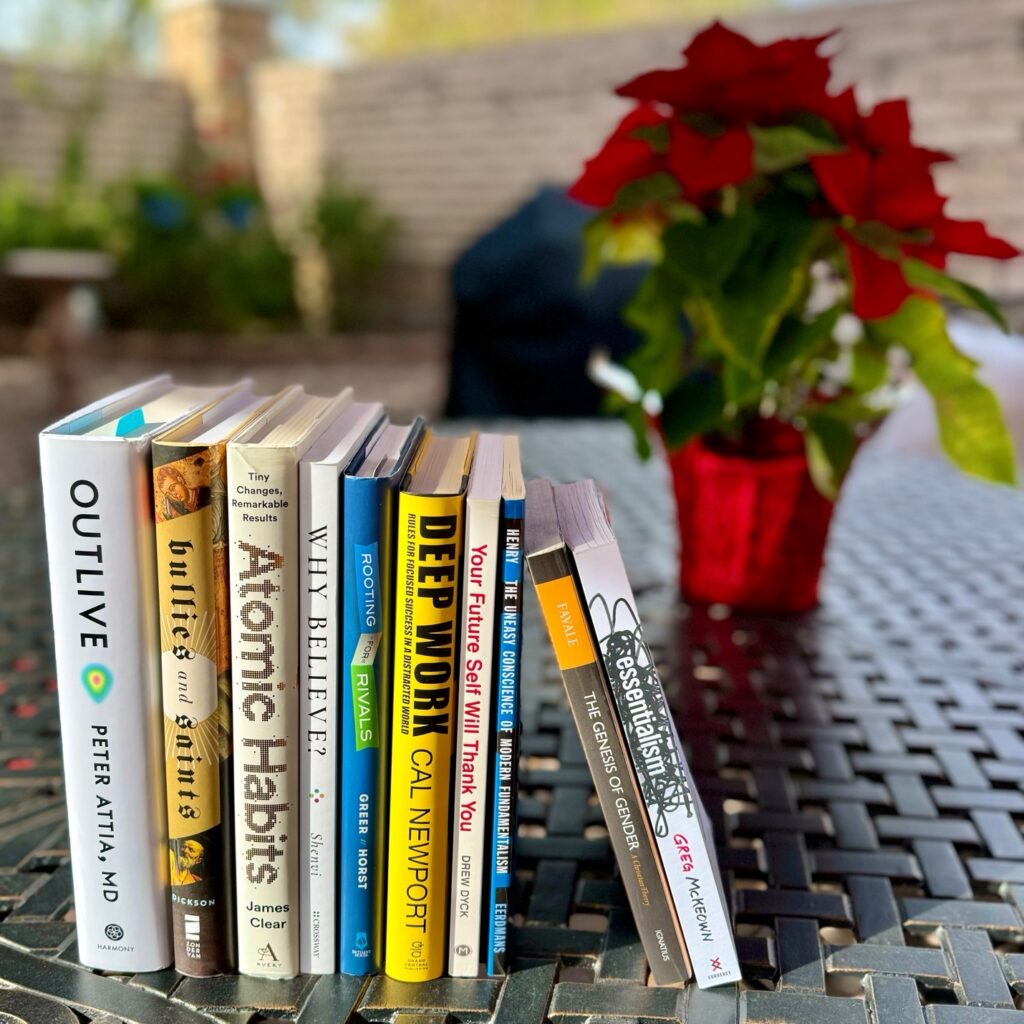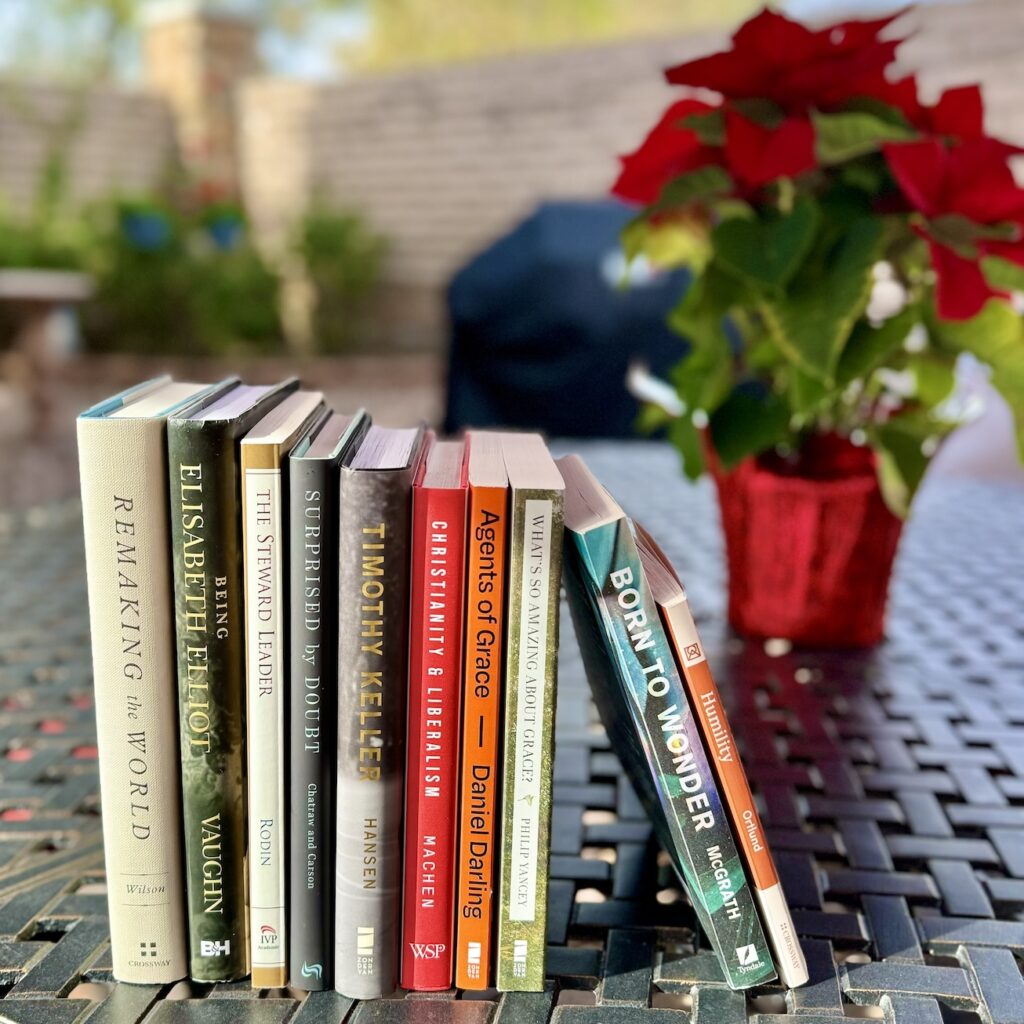
Last week, I shared the list of My Top 10 Books for 2023. This week, I wanted to follow it up by sharing my Top 10 ‘Honorable Mentions’ from this past year.
Here’s my list:
#10
Atomic Habits
by James Clear
(Re-Read) I first read this outstanding book several years ago. I have since read it four times—it’s that good. Bottom line: if you want an easy, proven way to build good habits and break bad ones, this book will help you. This book was written six years ago, yet it still landed on the New York Times Best-Seller List this past year.
#9
Your Future Self Will Thank You: Secrets to Self-Control from the Bible and Brain Science
by Drew Dyck
(Re-Read) This book’s ‘Sub-Sub’ Title is A Guide for Sinners, Quitters & Procrastinators. This book is biblically-based and filled with practical insights that will help anyone wanting to develop greater self-control (self-discipline). Lee Strobel said this about the book: “Few books have the potential to change your life as much as this one.” Drew Dyck is an editor at Moody Publishers and has written several outstanding books.
#8
Essentialism: The Disciplined Pursuit of Less
by Greg McKeown
This book isn’t about getting more done in less time; it’s about getting only the right things done. This book will help you to ‘focus’ on that which is most important in your life. Have you ever found yourself stretched too thin? Are you often busy, but not productive? Do you feel like your time is constantly being hijacked by other people’s agendas? Here are four brief quotes I saved from the book:
“Remember, if you don’t prioritize your life, someone else will.”
“It is about making the wisest possible investment of your time and energy in order to operate at our highest point of contribution by doing only what is essential.”
“Sometimes what you don’t do is just as important as what you do.”
3 End-of-Day Questions:
What went well?
What could have been better?
What will I change for tomorrow?
#7
Deep Work: Rules for Focused Success in a Distracted World
by Cal Newport
(Re-Read) You may have noticed that three of the last four books were ‘re-reads’ for me. The reason? In order to finish my Ph.D., I knew I needed to increase my ability to do deep work, prioritize what is most important, increase my self-discipline, and develop and maintain better habits.
The above four books will help anyone wanting to grow in these areas of life. Deep Work (in my opinion) is desperately needed in our ‘distracted, entertainment-focused, social-media-saturated, internet-dominated culture’ in which we live. Attention spans to accomplish deep thought and deep work continue to shrink—this is why fewer and fewer people read books. They are losing their ‘mental muscle’ to read, think, and write carefully and thoughtfully. This book was both encouraging and challenging.
#6
The Gospel: How the Church Portrays the Beauty of Christ
by Ray Ortlund
(Re-Read) I have read this several times since it first came out in 2014. It is simply one of the best little books on ‘What is the Gospel?’ Ortlund also develops the concept of ‘gospel culture’ and why it is so necessary that we pay attention to it within our churches and organizations.
Here are two short quotes from the book on Gospel Culture:
“Our unity exalts Jesus in the eyes of the world as the true Son of God sent from the Father—all his claims convincing, all his purposes desirable, all his promises inevitable. This was important enough to Jesus that he prayed for it.”
“Our churches should rejoice over one another’s successes and grieve over one another’s setbacks. We should speak well of one another across denominational lines and humble ourselves in our own eyes by forgiving past injuries and promoting the common good in the gospel.”
#5
Outlive: The Science and Art of Longevity
by Dr. Peter Attia, MD
I heard about this book from several people, and then when Pastor Kevin DeYoung (Christ Covenant Church and part of The Gospel Coalition) listed it as one of his “Top 10” books of 2023, I purchased it in late December and read it over the holidays.
Dr. Attia contrasts “lifespan” (how long we live – the quantity of our years) with “healthspan” (how well we live – the quality of our years). He gives numerous highly reputable PhD research studies to support his assertions on the importance of maintaining a healthy diet, regular exercise, and a good sleep regimen.
Here is one brief quote on the importance of regular exercise as we age:
“More than any other tactical domain we discuss in this book, exercise has the greatest power to determine how you will live out the rest of your life… [regular exercise] delays the onset of chronic diseases, pretty much across the board, but it is also amazingly effective at extending and improving healthspan… So if you adopt only one new set of habits based on reading this book, it must be in the realm of exercise… And if exercise is not a part of your life at the moment, you are not alone—77 percent of the US population is like you… Even a little bit of daily activity is much better than nothing.”
#4
The Genesis of Gender: A Christian Theory
by Dr. Abigail Favale, PhD
To say that we are living amid ‘gender confusion’ in the U.S. is certainly an understatement. The question of gender – who we are as men and women – has never been more pressing or more misunderstood. In this book, Dr. Favale weaves her own personal experience with expert knowledge.
She writes with substance, clarity, and compassion. She lays out a powerful, moving articulation of a Christian understanding of reality: a holistic paradigm that proclaims the dignity of the body, the sacramental meaning of sexual difference, and the interconnectedness of all creation. If you want to better understand the ‘what’ and ‘why’ of gender confusion today, read this book.
#3
Bullies and Saints: An Honest Look at the Good and Evil of Christian History
by John Dickson
How do we answer people in today’s culture who bring up some of the atrocities that have been done in the name of Christ (by Christians) down through the centuries? Whether those atrocities include violence, bigotry, war, oppression, racism, greed, child abuse, or something else. Do we turn a deaf ear? Try to sweep it under the rug?
If you know anything about history, you are aware that there have been Christians down through the centuries who have been “bullies” and have not represented Christ honorably. How do we respond intelligently and graciously? This book will help equip you to answer many of those questions. John Dickson is an excellent historian and apologist. I’ve read almost all of his books.
#2
Why Believe? A Reasoned Approach to Christianity
by Neil Shenvi
This has become one of my favorite ‘go-to’ books that I recommend to people who want to investigate the claims of Christianity (in an accessible 250-page book). It does a beautiful job of exploring the evidence for the Christian faith. It is written with the 2020s and many of the current issues in apologetics in mind.
Dr. Shenvi received his PhD from the University of California Berkeley (where he came to faith in Christ!), then worked as a research scientist at Yale University and Duke University. Neil has published over thirty peer-reviewed papers.
#1
Rooting for Rivals: How Collaboration and Generosity Increase the Impact of Leaders, Charities, and Churches
by Peter Greer and Chris Horst
This is a book that I wish I had written. It describes my heart through my years of pastoring and now leading Global Training Network. I kept saying “Amen!” as I read it. It describes why we should work together as church and para-church organizations to further God’s Kingdom for His Glory.
Too often, there is rivalry, envy, or jealousy between local churches in the same city or fellow mission organizations seeking to serve Christ around the world. These authors look at the “Seven Deadly Sins” and show how they often show up in churches and Christian ministries—so that rather than working together for God’s glory, they criticize, compare, and divide.
Rather than ‘rejoicing with those who rejoice’ and ‘weeping with those who weep’ (Romans 12:14), they instead ‘rejoice with those who weep’ and ‘weep with those who rejoice.’ Read this and be encouraged about the importance Scripture places on working together for God’s glory.




















